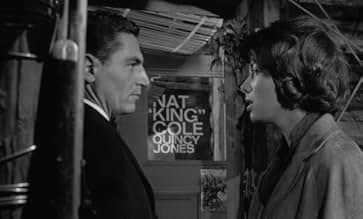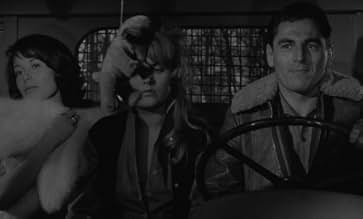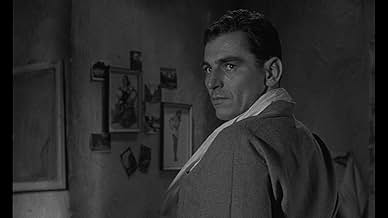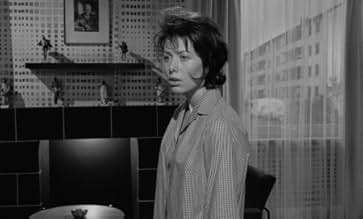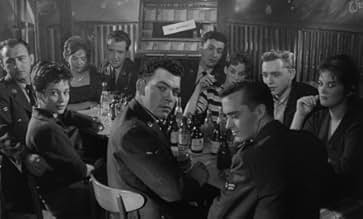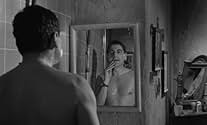A West German trucker who illegally sells black gravel reunites with a former lover, now married to an American.A West German trucker who illegally sells black gravel reunites with a former lover, now married to an American.A West German trucker who illegally sells black gravel reunites with a former lover, now married to an American.
- Director
- Writers
- All cast & crew
- Production, box office & more at IMDbPro
Featured reviews
In post-war Germany, in a dreary small town near a US air force base, some of the local truckers hired by the Americans to supply the base with gravel and other construction supplies have a side job in the black market. Trucker Robert, underplayed to anti-hero perfection by Helmut Wildt, lives in a room above a brothel-bar in town and has an emotionless relationship with one of the B-girls (Anita Hofer) who has a yen for him. One day he spots an old flame(Ingmar Zeisberg), now married to an American officer running the base, and attempts to relight their fire in secret, a decision that leads to a tragic accident. It's all downhill after that.
It's downbeat, but one of the most compelling dramas about post-war Europe I've ever seen. It was cut to remove an anti-Semitic outburst by a bar drunk but restored in 2009. The tech credits and all of the performers, from the main actors to the extras, are excellent. It hasn't been shown on Noir Alley--it should-- but Eddie has programmed it at several festivals. Directed and co-written by Helmut Kautner, it was not the kind of commercial film the West German studios were producing in the late 1950s and 1960s.
It's downbeat, but one of the most compelling dramas about post-war Europe I've ever seen. It was cut to remove an anti-Semitic outburst by a bar drunk but restored in 2009. The tech credits and all of the performers, from the main actors to the extras, are excellent. It hasn't been shown on Noir Alley--it should-- but Eddie has programmed it at several festivals. Directed and co-written by Helmut Kautner, it was not the kind of commercial film the West German studios were producing in the late 1950s and 1960s.
This is rather terrific and very different something like a noir, but certainly very dark and nasty with some surprisingly, sudden moments of nudity. Set in Sohnen, a fictional village, in Hunstrueck near by a US airbase using to train jet pilots although here we do not see these but instead we have the black market and this amazing bar and brothel. There is death from the very beginning and some more but none of those sexy kills and there is something worrying amidst the rubble and muddy sites while overhead the whine of those jets. In that bar there is fun and sex and music from the jukebox but dark outside there is death and passion and nothing sentimental at all. The location shooting was done at the Hahn Air Base and the interiors in Berlin. Helmut Kautner filmed throughout the war but after this one there were clearly problems and even making some cuts it disappeared and afterwards he moved into TV.
A 1961 German film which was presented on Noir Alley which qualifies for being a neo-noir. It's post war Germany & the residents are trying to make ends meet while under the scrutiny of the American armed forces still stationed there. Our anti-hero, Helmut Wildt, is met making his rounds driving a truck which carries the occasional black market item but one day he runs into a military man & his wife, Ingmar Zeisberg, stranded by the side of the road & offers them a ride into town for help. He recognizes Zeisberg as an old flame & they reunite awkwardly but her new life & his current one is at odds w/them actually making any headway. They do eventually hook up & one night while they're driving in his truck unbeknownst to them a pair of lovers, who Wildt knows, end up being run over by his truck which prompts Wildt to take care of the situation while he tries to keep Zeisberg out of it. What follows is chapter & verse of what we've come to expect from noir but here done exceedingly well w/Wildt being championed by the audience, no matter how rotten he seems, to succeed but we know that's not the case even though according to host Eddie Muller even German audiences felt the ending was too bleak for them which says a lot.
While I disagree with Eddie Muller's opinion, voiced on TCM's Noir Alley, that this 1961 German film is a masterpiece...the American characters, played by Germans, are too stiff/caricatured, for one thing, and the key scene where Bill/Anni are killed is badly edited, for another...I do think it's a very good late era noir. It does what all fine entries in this darkest of genres must do, namely create a believable moral hellscape. In this case it is West Germany in the uneasy period when WW2 was still very much alive in the hearts/minds of the defeated Germans and relations with the victors is fraught, to say the least. The key visual symbols of this tense, fearful and more than occasionally violent mood are the gravel pit/burial ground and the divey bar/brothel where ceremonies of moral corruption, from stealing to anti Semitism to murder, are enacted. And through these images the tawdry, bleak, lost atmosphere is powerfully conveyed by director Helmut Kautner. Indeed, too powerfully for the German censors of the time who preferred a more "uplifting" vision of their country in the Kennedy 60s (think Elvis in "GI Blues") and thus falsely accused the film of hostility toward Jews (it is, actually, quite the opposite) and ostracized Kautner from film making . Hard to feel too sorry for the guy who, after all, worked steadily in Germany under the Nazis, but certainly not difficult to feel exasperation at the willful misunderstanding from the cultural establishment. B plus.
"Schwarzer Kies" is an extremely bleak movie that makes me wonder it ever found enough supporters to get made at all. The dark, disturbing story is portrays a German village living off an American Air Force Base (around 1960) mostly by cheating and prostituting. It is not surprising that the film didn't do much money at the box office. And the film was hurt by an accusation of antisemitism, which led to being recut to avoid a bad press. The accusation was a clear misinterpretation. What the film really did, was to show that antisemitism was still around and some people had not changed.
The Americans (all played by German actors) do not appear much better than the Germans. Their plan to build a rocket launch base does not sound very promising for peace. The soldiers are shown mainly frequenting a local bar/bordello and the officers checking bills and hoping to leave soon for a better post. Director Helmut Käutner did not spare many, most people in his film are in some way cunning, every one seems to be involved or at least in the know of the black market around the base. From the very first scene to the very last, the film is most uncompromising in his portrait of greed, lust and bondage.
The actors are all unknown today although they did a good job. It is a Germany we have never seen on film before or even after. It took guts to get this film made. The Friedrich Wilhem Murnau Stiftung did a great job restoring the film to its original lenght and optical quality.
The Americans (all played by German actors) do not appear much better than the Germans. Their plan to build a rocket launch base does not sound very promising for peace. The soldiers are shown mainly frequenting a local bar/bordello and the officers checking bills and hoping to leave soon for a better post. Director Helmut Käutner did not spare many, most people in his film are in some way cunning, every one seems to be involved or at least in the know of the black market around the base. From the very first scene to the very last, the film is most uncompromising in his portrait of greed, lust and bondage.
The actors are all unknown today although they did a good job. It is a Germany we have never seen on film before or even after. It took guts to get this film made. The Friedrich Wilhem Murnau Stiftung did a great job restoring the film to its original lenght and optical quality.
Did you know
- TriviaFirst German film shown on TCM's "Noir Alley" on 14 December 2024.
- GoofsAnni and Bill invite Bob into the back of their car to get out of the rain. BUT once in the car Bob's hair and jacket collar are dry, even though the rainfall on the rear window is quite obviously quite significant.
- Alternate versionsShortly after its general release, the film was changed from its premiere cut. Due to complaints by the Central Council of Jews in Germany, two scenes were shortened in which a character is revealed to be a Holocaust survivor and an antisemitic slur is used against him. The ending was also changed and is much less dark: in the shortened cut, both Inge and Robert survive. The premiere cut was restored during the film's digital restoration in 2016.
Details
- Runtime1 hour 53 minutes
- Color
- Sound mix
- Aspect ratio
- 1.66 : 1
Contribute to this page
Suggest an edit or add missing content


